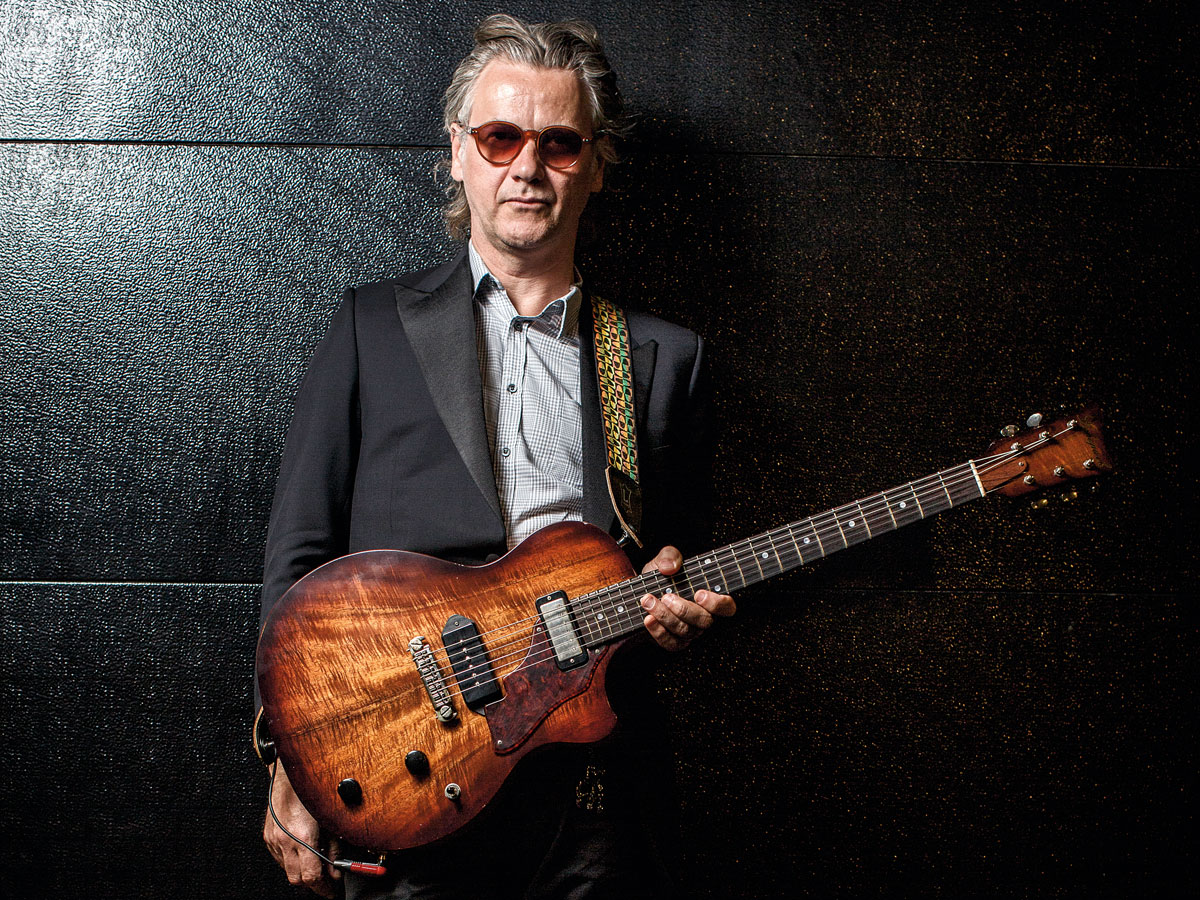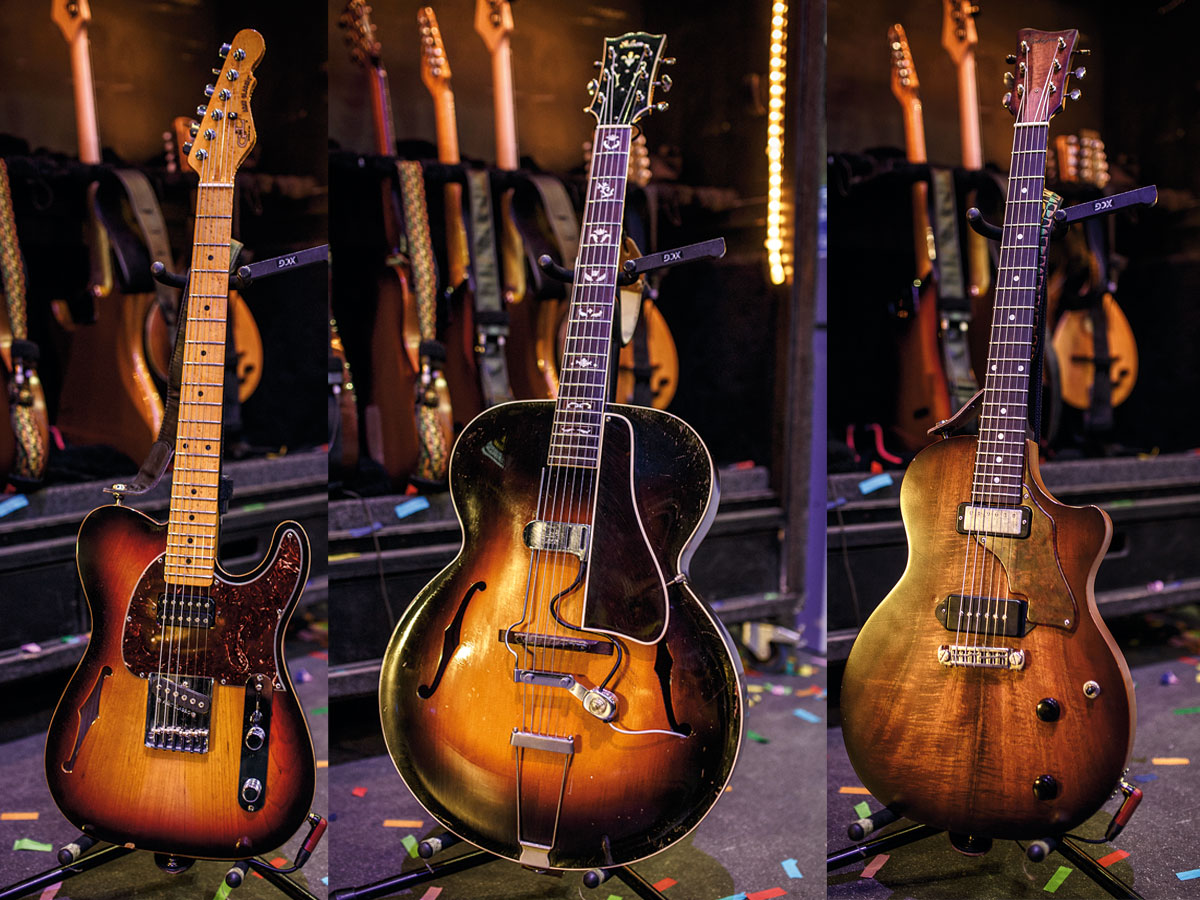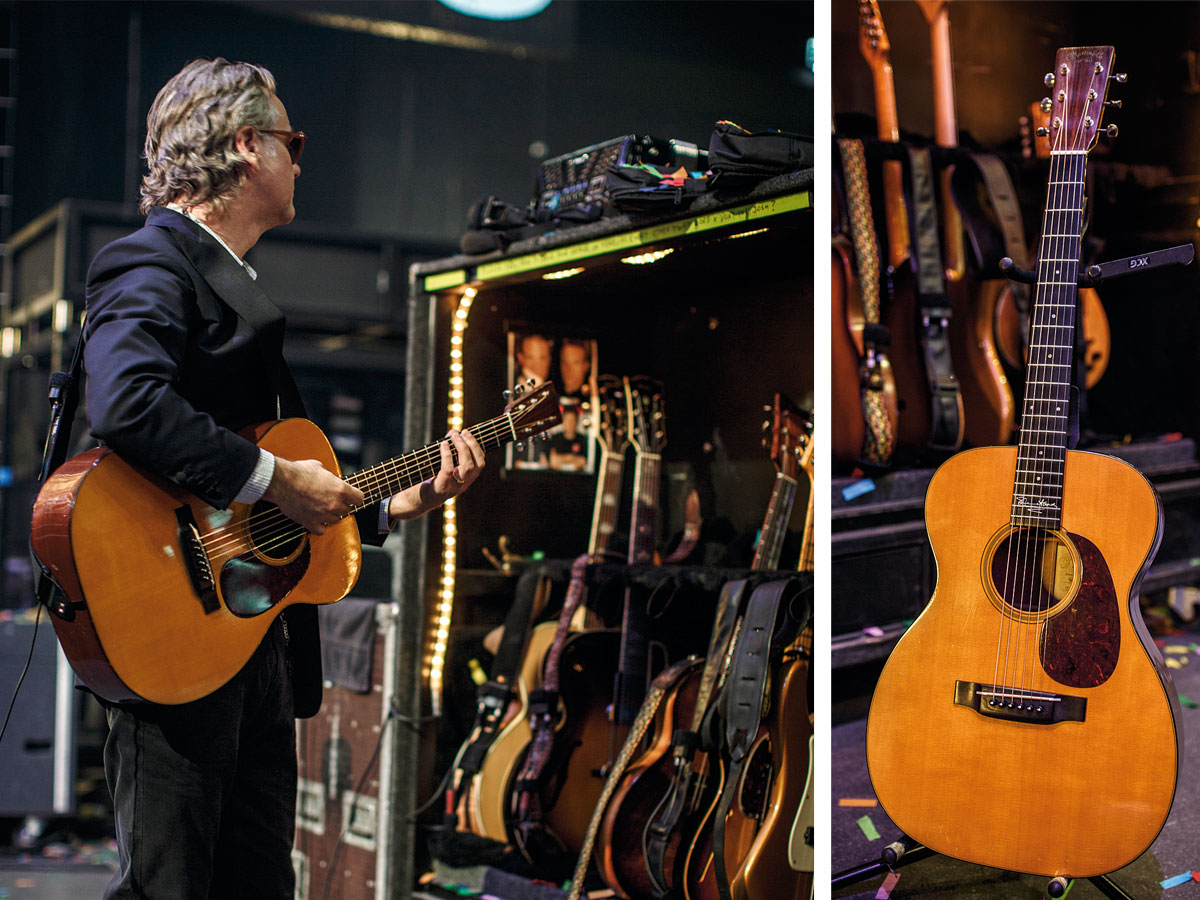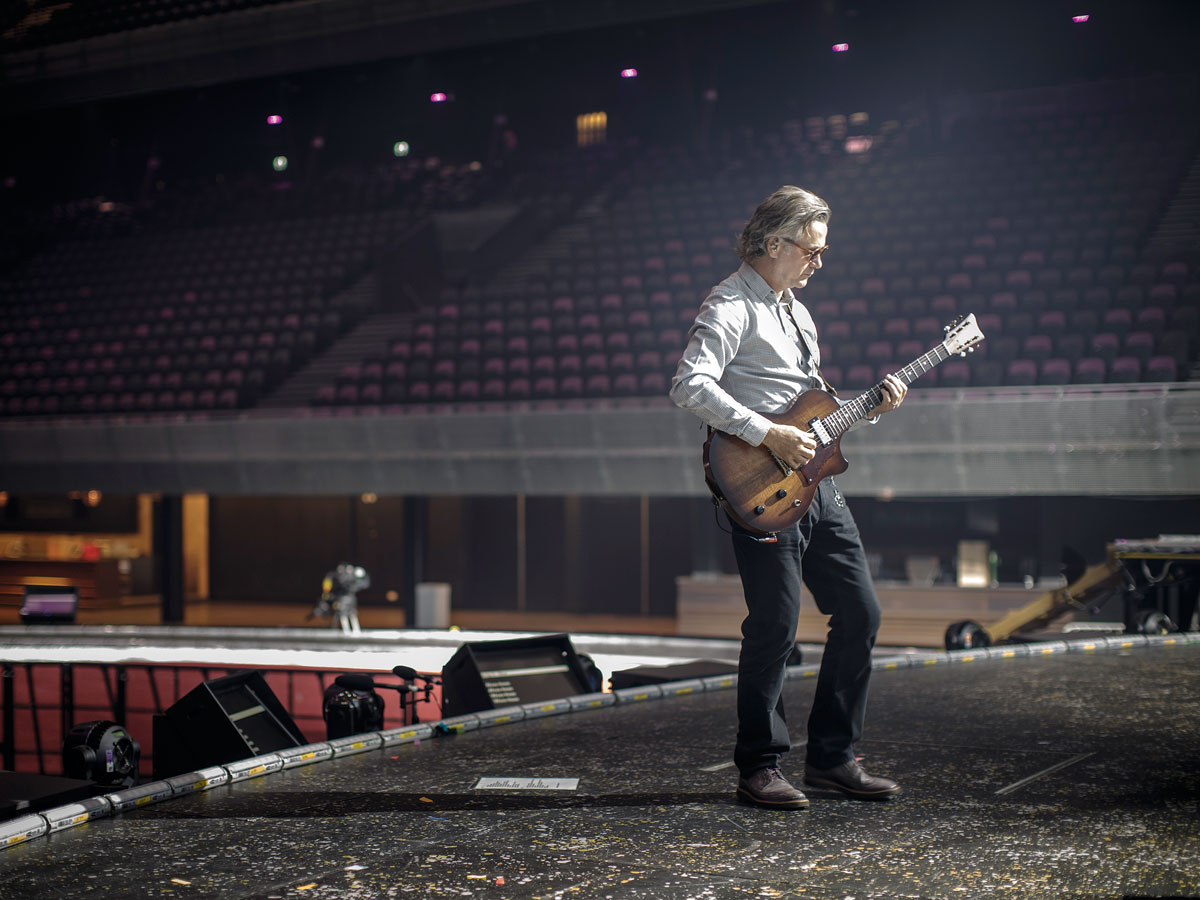Guy Chambers on his gear, George Harrison and golden rules
Robbie Williams' six-stringer and songwriting partner talks

Introduction
A few minutes into our interview, Guy Chambers says what we’re is thinking. “Robbie and me are the complete opposite,” observes the songwriter, “in so many ways. But that’s why it works so well.” He’s right, on both counts. Chambers is a dry, thoughtful, 51-year-old Londoner who admits he spends downtime on tour researching local history.
When he hooked up with Robbie Williams in 1997, the man that Noel Gallagher somewhat harshly described as the “fat dancer from Take That” was widely expected to crash and burn. And yet, from that year’s Life Thru A Lens on, this apparent mismatch clicked, the pair becoming loyal friends and forming one of modern pop’s solid-gold writing partnerships. Let Me Entertain You, Strong, Kids, Feel, Angels... As the millennium turned, Williams/Chambers were quite simply untouchable.
"The actual recordings were done the old-fashioned way. For me, that’s still the most exciting way to make a record"
On the flipside, it’s surely no coincidence that when the duo parted ways after 2002’s Escapology, subsequent Robbie releases didn’t quite have the sparkle (when was the last time you listened to Rudebox?). Perhaps the downturn wasn’t lost on either man. Chambers returned for six co-writes on last year’s chart-topping Swings Both Ways album, and when Guitarist calls him on the associated tour, he’s revelling in his role as live guitarist.
Did you enjoy making Swings Both Ways?
“Yeah, and one of the reasons it was so much fun was that pretty much every track was a band playing in a room, at Capitol Studios. I love that immediacy. That’s one thing that hasn’t changed for me. I mean, that whole first album [Life Thru A Lens] was a mixed experience, because Rob was still drinking, so we did a lot of hanging around, hoping he’d turn up. That was stressful. But the actual recordings were done the old-fashioned way. For me, that’s still the most exciting way to make a record: a bunch of people making a great noise.”
What are the challenges of playing guitar in the live swing band?
“Keeping out of the way is the first thing. Some of it is very traditional swing, so for that you’re sort of chugging along as part of the rhythm section. I don’t do any solos or anything. Live, it’s just a case of blending in with whatever [guitarist] Gary Nuttall is doing. If he’s playing a ukulele, I’ll play something that will balance that.”
"I’m a big believer in simple things that have maximum effect. That’s my whole thing"
It’s not about virtuosity?
“I’m a very un-technical person, even though I did have proper Spanish guitar lessons when I was a kid. I went up to Grade 7, took it pretty seriously as a teenager. But I stopped at 16, because by then I was much more obsessed with the sound of an electric guitar and the simplicity. I’m a big believer in simple things that have maximum effect. That’s my whole thing. I’m the opposite of a shredder. Not that there’s anything wrong with shredders. But I’d never want to do that, even if I could. I’ve played a lot of guitar on Robbie records, but most of my parts are simple, chuggy powerchords.”

The Robbie rig
Can you talk us through your touring rig?
“Well, there’s this guitar called an Echopark Downtowner Custom that’s like a cross between a Les Paul and SG. When I was doing Swings Both Ways in LA, I was staying at the Sunset Marquis and there was a guitar magazine in the room. I happened to look through it and I saw this thing. The guy from Queens Of The Stone Age [Josh Homme] has got one, and I like him a lot. Anyway, Gabriel Currie [the man behind Echopark - Ed] brought one down to the studio, and then I basically said, ‘Can you make me one?’ Three months later, it turned up at the studio, and I use that all the time now. That’s for when I’m playing the more rocky side of what Robbie does.
“I also use a Martin Steve Howe acoustic, and a really old Gibson [ES-150] with the original Gibson logo, and a very old pickup that you can move back and forth.”
How about your amps?
“It’s a Fender Deluxe [‘blackface’ Reissue], but I don’t know the year. It’s got the right kind of crunch, for me. I don’t like fuzzy amps. I like it crunchy, but so you can still hear the quality of the chords. I don’t like it when it turns into a mush. I like to be able to hear the tones of the chords and the notes. I play a lot of picky stuff - it’s not just powerchords - so it needs to be clear. But it also needs to be pokey, because it’s a 17-piece band, and that makes a lot of noise. If I had a clean sound, you actually probably wouldn’t even hear it.
“I’m anti-pedals. I don’t have any. It’s just the guitar and the Deluxe. I don’t like having anything on the floor and I like to be able to wander around. I’ve got a radio setup, which is handy when we’re soundchecking, because I can go and listen to the band from where the soundman is, still playing guitar. This is my first tour since 2002, and the biggest change technically is that in the old days, we had monitors and side-fills everywhere: it was so loud onstage. These days, everybody is on in-ears. On this tour, I don’t think anything has fed back once. Things used to feed back all the time...”

Songwriting
What are your favourite songs from Swings Both Ways to play live?
“Shine My Shoes is a good one. I’m using the Echopark, and playing octaves all the way through, just trying to make the bass more dirty and the song feel more like Let Me Entertain You. It’s not as pure as it is on the album. I’m sort of beefing it up, I suppose, making it more powerful.”
Do you think the guitar is a good instrument for songwriting?
"I love the portability of the guitar, the fact you can play it on the beach"
“Of course. I love the portability, the fact you can play it on the beach. I’m a big believer in capos, and I’m into tunings. I’m always messing around with them. I like open tunings: y’know, DGDGBD, that one [open G]. There’s also a song called Me And My Monkey, and that’s quite an unusual tuning.
“The A string is tuned up to B on all the acoustic and electric guitars. It’s in E minor, so when you play an E chord, you’ve got that resonance of the low E and the B, and it’s a really great sound. When something is open-tuned, it has a different resonance. The sound of that track is that tuning. It gives the song a dramatic character. If you don’t play it with that, it doesn’t sound the same.”
When you look back at the classic Robbie material, which songs started on guitar?
“Well, Me And My Monkey did. We wrote that one in Taiwan, backstage, waiting to go on. Better Man was written on acoustic. A lot of the less-famous ones, like Karma Killer: that was just written on acoustic when we were on holiday in Jamaica. Britpop definitely had a big influence on the first three Robbie records, and that was very guitar-heavy.”
Do you have a ‘lucky’ guitar that always sparks great songs?
“Yeah, my 1969 Les Paul Goldtop Deluxe. I got it at Chelsea Guitars in New York. This is a nice little story. It was a long time ago, back in 1990, when I didn’t have any money. I was in a band called World Party. I literally had $300 cash, which to me, at the time, was a lot.
"In the 90s, I had one electric, one acoustic, a bass - that was it"
"I walked in, and that guitar, it just so happened, was $300. They’d marked it up wrong: it should have been $3,000, even in 1990. And I clocked that straightaway, but of course I didn’t say anything.
“Luckily for me, there was some stoned youth working there that day who didn’t check it, and next minute I was walking out with this amazing Les Paul. So that’s my kind of ‘lucky guitar’. There’s an early song called Lazy Days that was written totally on that guitar. Let Me Entertain You, as well.
"I mean, that song, obviously it’s a piano-driven thing, but when we did the demo, that was the guitar. At that point, I only really had one guitar. In the 90s, I had one electric, one acoustic, a bass - that was it. I couldn’t afford anything else. I was broke!”
Your collection looks a lot healthier these days...
“Well, yeah, I did go a bit potty once I had some money.”
People think of Angels as a piano-driven song. But it had that great slide solo...
“Yeah. I sang that, but I didn’t play it: a guy called Andre Barreau did. He was in The Bootleg Beatles. I actually wanted George Harrison to do it, and we’d approached him - and he said no.
"So then, me being me, I thought, ‘Well, what’s the second-best thing to George Harrison?’ And I thought, ‘Andre from The Bootleg Beatles!’ So we got him to do it, with his SG, which is exactly the same SG as George had on Revolver, whatever that is.”

Guy's golden rules
How many songs do you write a day?
"I don’t know if I’m a natural hit-writer. I think I write what I write. Sometimes they’re successful and sometimes they’re not."
“Well, at the moment, not many, because I’m touring and it’s been quite exhausting. I used to write about 80 songs a year when I wasn’t touring. I think this year, it will probably be more like 40. I’m enjoying having a break from the pressure of having to write hits. Which I wasn’t always that good at, to be honest with you. I don’t know if I’m a natural hit-writer. I think I write what I write. Sometimes they’re successful and sometimes they’re not.”
Is songwriting a natural talent or a craft?
“I think DNA does come into it. My dad is a musician and my mum was an amazing singer, so I had good musical genes, for sure. But then again, looking back, I think my dad doing ear-training with me when I was a kid was pretty important, in terms of being able to spot what notes are in a chord, and do a harmony to a melody by ear.
"But to actually write hits, I think a lot of it is being with people who are really good, hopefully better than you. I’m always looking for new collaborators, especially production-wise. Y’know, young producers who do things that I can’t do with sound, because they have the patience to sit with software and experiment for hours. They’re doing something that I can’t do. And likewise.
"So I would always say to any young songwriter: find someone to collaborate with who’s better at something, who covers your weak spots. Because we all have weak spots.”
Do you have any advice on how to create a compelling song?
“I do have some golden rules. I suppose one is, if it’s over four minutes, it better be the world’s greatest song. Like, Angels is over four minutes... but that’s a pretty good song. If the chorus doesn’t hit before a minute, there’s probably a problem. What else? When you play it to your mates, if they’re not moving in some way, it probably means the track is flawed.
“I still hear people singing in the wrong key. Y’know, I worked with Tina Turner once, and she said that on every single one of her hits, she always said to the producer, ‘I want to go as high as possible’. So my kind of rule of thumb with singers is, I try to push them... obviously not so high they sound like they’re struggling, but to where they sound intense and exciting. Pop music should be exciting, really. Or sexy. Or maybe both.”
Do you have a favourite chord?
“I really like Em9.”
Ever feel relieved you wrote your first million-selling songs before the internet?
"It’s always been hard. Yes, I was in a golden age, but I had years of struggle before I made any money"
“Well, I can’t lie. Yes. I count it as a blessing that we were in the last golden age of CDs. But, y’know, I do believe that through streaming - and through something else that hasn’t been invented yet - we will come into another golden age. You’ve got to remember, there’s a million millionaires in China, and they’re going to want to have premium streaming, and their kids will.
"I know that bands can survive from streaming now, because I speak to them. They don’t earn a lot of money, but they can survive. And then, y’know, they might get a sync on an ad or whatever. Y’know, we’re in a different world, but it’s not a bad job being a musician, even now. It’s always been hard. Yes, I was in a golden age, but I had years of struggle before I made any money.”
Robbie has been known to play guitar live - do you rate him?
“[laughs] He knows enough to accompany himself. I mean, I taught him to play guitar. All he wanted was to be able to play Better Man and Sexed Up. He would admit he doesn’t practise, and he doesn’t even pick it up every day. Y’know, he’s basic. He’s more focused on words.
“He’s always looking for lyrical tricks or phrases that amuse him. He’s fascinated by words, more than picking up an instrument. He doesn’t have much interest in instruments, to be honest. Which suits me, because I’m obsessed with instruments...”

